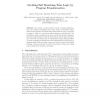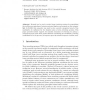4757 search results - page 13 / 952 » Monads for Functional Programming |
117
Voted
HASKELL
2006
ACM
15 years 8 months ago
2006
ACM
In this article we present GenI, a chart based surface realisation tool implemented in Haskell. GenI takes as input a set of first order terms (the input semantics) and a grammar...
98
Voted
SIAMCOMP
2008
15 years 2 months ago
2008
Abstract. Monadic second-order unification is second-order unification where all function constants occurring in the equations are unary. Here we prove that the problem of deciding...
127
Voted
CSFW
2005
IEEE
15 years 8 months ago
2005
IEEE
This paper advocates a novel approach to the construction of secure software: controlling information flow and maintaining integrity via monadic encapsulation of effects. This ap...
139
Voted
LOPSTR
2009
Springer
15 years 9 months ago
2009
Springer
Abstract. We present a method based on logic program transformation, for verifying Computation Tree Logic (CTL∗ ) properties of finite state reactive systems. The finite state ...
116
Voted
CTCS
1997
Springer
15 years 7 months ago
1997
Springer
Monads can be used to model term rewriting systems by generalising the well-known equivalence between universal algebra and monads on the category Set. In [L¨u96], this semantics ...



